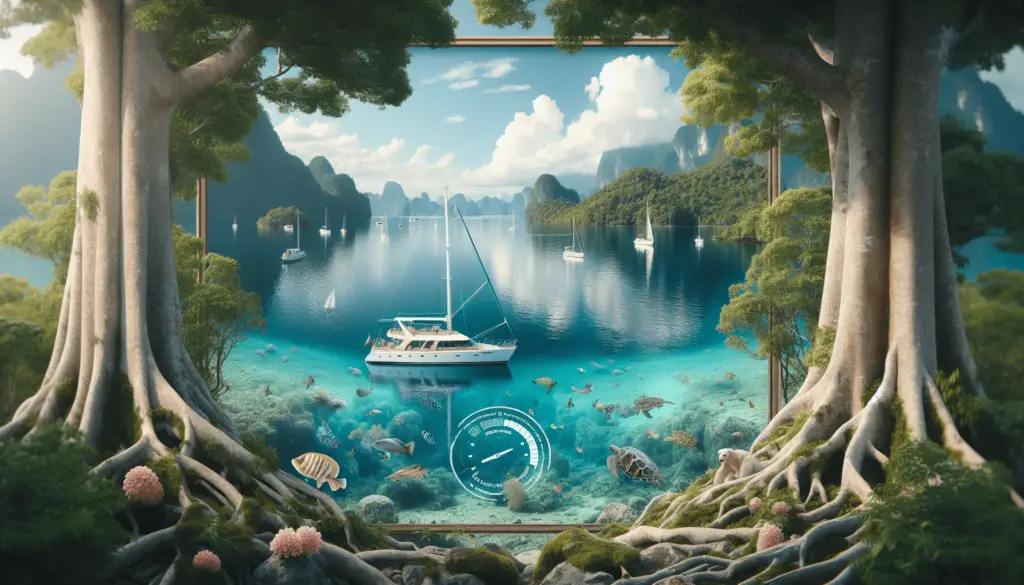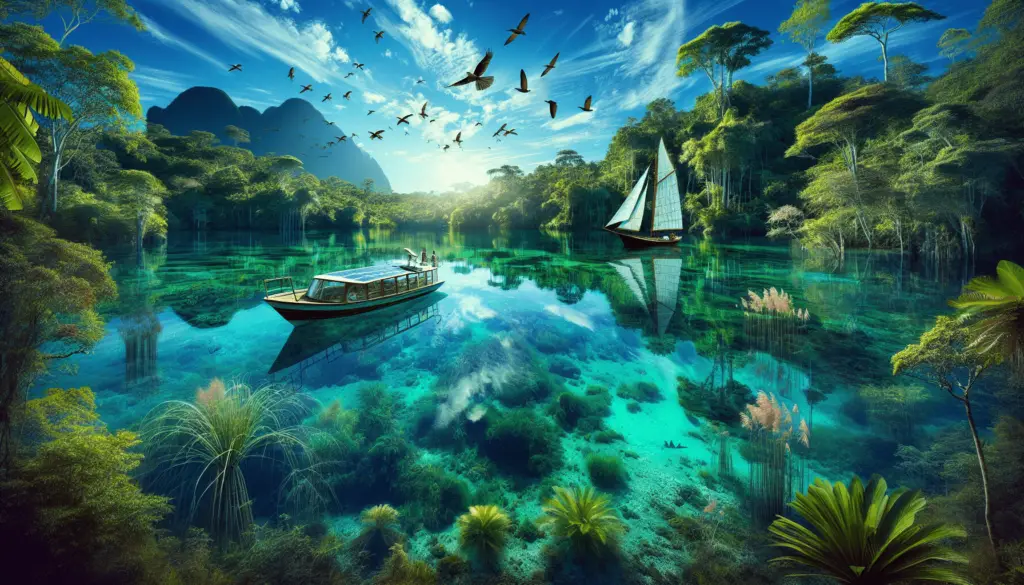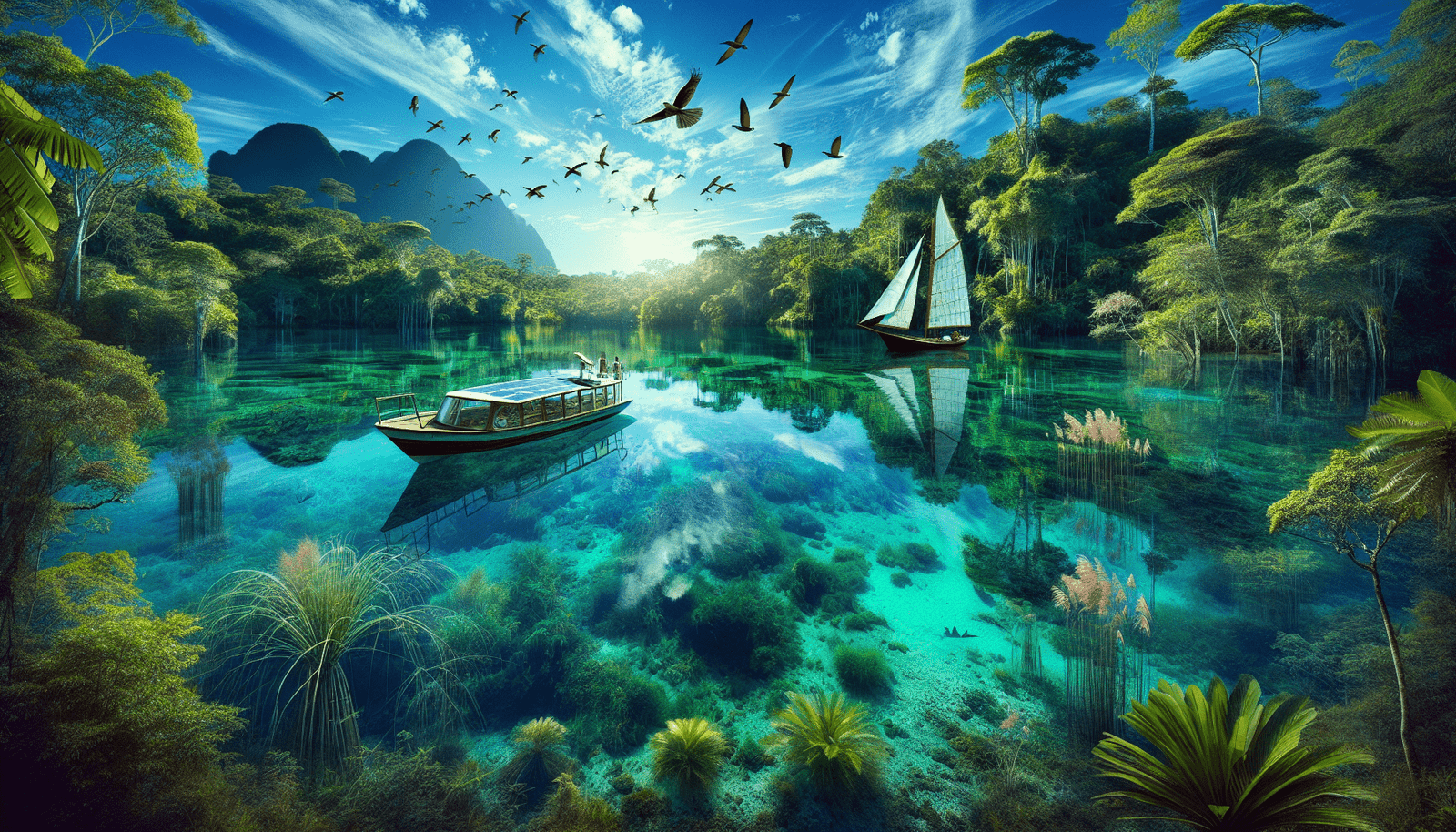Imagine venturing out on a pristine lake in your boat, the serenity of nature surrounding you. Now, consider the opportunity to make that experience even better by doing things a little differently – in a way that leaves less impact on the environment while maximizing your enjoyment. “eco-friendly boating practices In National Parks And Protected Areas” is a thoughtful exploration on how you can contribute to the preservation of these places while engaging in an activity you love. Through various eco-friendly practices, you can ensure that these waters remain clean, vibrant, and full of life for future adventurers like yourself.

Understanding Eco-Friendly Boating
Eco-friendly boating, as you might already guess, is about being mindful of the environment while enjoying your time on the water. It involves taking steps to minimise the negative impact of boating activities on the environment, by being cautious with what you dispose of in the water, minimising noise pollution, and using renewable energy sources wherever possible.
What Eco-Friendly Boating Means
When we talk about eco-friendly boating, we’re talking about a conscious effort to reduce your boating activities’ impact on water bodies and aquatic life. It’s about optimising your practices to ensure the least harm is caused to the environment. This could involve anything from reducing fuel consumption and maintaining your engine well to reducing turbulence and choosing appropriate boating equipment.
Why It Is Important?
Given our increasing concerns about the environment and sustainability, it’s essential to rethink every aspect of our lives, boating included. Water bodies offer delicate ecosystems that are easily affected by pollutants, noise, and human interference. Minimising these impacts through eco-friendly boating strategies can play a crucial role in preserving marine life and obtaining clean, healthy water bodies.
How It Affects the Ecosystem
The activities involved in traditional boating can have a significant impact on the ecosystem. Boat engines generate pollutants that get discharged into the water and harm aquatic life. Noise pollution from boating disrupts marine life, sometimes leading to abnormal behaviour in aquatic animals. Also, the physical movement of boats can disturb underwater habitats. By implementing eco-friendly boating practices, we can significantly reduce these impacts and support a healthier marine ecosystem.
Regulation and Laws Governing Boating in National Parks
National parks often house diverse and delicate ecosystems, making them particularly vulnerable to harm from boating. That is why regulations and laws are needed to manage boating activities in these areas effectively.
The Need for Laws and Regulations
Without laws and regulations, it would be difficult to prevent people from causing harm to the environment unintentionally. There is widespread ignorance about the impact of boating on marine environments, and without laws and regulations, it would be challenging to ensure everyone behaves responsibly on the water.
Understanding National & International Laws
Different countries have different laws regarding boating, and even within a country, rules can differ from one water body to another. It’s crucial to learn the rules of the area where you plan to boat—both national and international ones—to ensure you’re compliant and not causing unnecessary harm to the environment.
How Regulations Protect the Ecosystems
Regulations provide a framework for protecting the environment from potential harm from boating activities. They might restrict certain areas from boating, maintain a speed limit to reduce turbulence, or mandate the use of particular equipment to minimise pollution. When followed correctly, they can significantly reduce the impact on the ecosystem.
Impact of Boating on the Environment
Boating, if not managed responsibly, can have several negative impacts on the environment. From noise pollution to water turbulence and fuel spills, the effects are numerous and potentially dangerous.
Noise Pollution
The engine noise of a boat can disrupt marine life, affecting their communication, navigation, and hunting. Chronic exposure might even lead to stress-related health problems in aquatic animals. It’s crucial to minimise this noise pollution whenever possible.
Water Turbulence and Its Effects
Boating activities can cause water turbulence, which can disturb aquatic life and their habitats. High-speed boating, in particular, creates a significant wake that can lead to shoreline erosion. It’s crucial to maintain appropriate speeds, especially in sensitive areas.
Hazards of Fuel and Oil Spills
Fuel and oil spills are among the most damaging aspects of boating to the environment. These spills pollute the water and can be extremely damaging to aquatic life. They also disrupt the balance of the ecosystem and can take years to clean up.
Eco-Friendly Boating Equipment
Many companies produce eco-friendly boating equipment to mitigate the impact of boating on the environment. From solar-powered motors to biodegradable boat cleaning products, many options can make your boating experience more environmentally friendly.
Solar Powered Motors
One of the most significant sources of pollution in boating is the engine. Solar-powered motors offer a clean alternative to fossil fuel-powered engines. While they might not be suitable for all types of boating, they can be a great option for smaller boats and shorter trips.
Biodegradable Boat Cleaning Products
Typical boat cleaning products can be heavy on chemicals, which end up in our water bodies and affect marine life. Biodegradable boat cleaning products break down naturally, reducing their impact on the environment.
Electric and Hybrid Boats
Electric and hybrid boats use electricity instead of, or alongside, fossil fuels, reducing carbon emissions and noise pollution. While still relatively new on the market, they’re a promising development in the quest for more eco-friendly boating.

Responsible Waste Management
Managing waste responsibly is a vital part of eco-friendly boating. From solid waste like food packaging to liquid waste like oil and fuel, it’s essential to have strategies in place for disposal.
Disposal of On-Board Waste
It’s essential to keep a trash bin on board and dispose of your waste properly once you’re back on shore. Throwing waste into the water is both illegal and harmful to the environment.
Managing Leftover Food and Cooking Waste
Leftover food can disrupt the balance of an ecosystem if discarded into the water. Similarly, cooking oils and cleaning products can pollute water and harm marine life. It’s vital to manage these substances responsibly.
Sustainable Ways to Clean A Boat
Traditional boat cleaning methods can result in harmful substances entering the water. Using eco-friendly cleaning products and methods can effectively clean your boat without harming the environment.
Navigational Techniques for Low Impact Boating
The way you navigate your boat can significantly impact the environment.
Reducing Speed to Minimize Wake
By reducing your boat’s speed, particularly in sensitive areas, you can minimise wake and, consequently, reduce shoreline erosion and disturbance to aquatic life.
Avoiding Sensitive Aquatic Habitats
Sensitive aquatic areas, such as nurseries or areas with a high diversity of species, can be particularly affected by boating. Using maps and navigation aids can help you avoid these areas.
Understanding and Using Marine Navigation Aids
Marine navigation aids, such as buoys and markers, can help boaters avoid sensitive areas and reduce their impact on the environment.
Awareness and Education about Eco-Friendly Boating
Raising awareness and education about eco-friendly boating is crucial to ensuring its widespread adoption.
Educational Programs or Initiatives for Boaters
Programs and initiatives that educate boaters about eco-friendly practices can play a significant role in promoting sustainable boating. They can cover everything from navigational techniques to waste disposal and boat maintenance.
Raising Public Awareness
broader public awareness can also contribute to more eco-friendly boating. People who aren’t boaters themselves can also influence boaters they know or support policy changes that favour eco-friendly boating.
Resources for Further Learning
There are many resources available for those interested in learning more about eco-friendly boating. Websites, YouTube channels, books, and marine courses can provide much further information.
Case Studies of Eco-Friendly Boating
Looking at successful examples of eco-friendly boating can provide useful insights and motivation.
National Parks with Efficient Boating Management
National parks have often led the way in eco-friendly boating, implementing policies and strategies to protect their delicate ecosystems. These range from speed limits to waste disposal rules and restrictions on where boats can go.
Positive Effects of Eco-Friendly Boating Practices
When eco-friendly boating practices have been implemented successfully, the results can be dramatic. Improved water quality, healthier marine life, and less shoreline erosion are among the potential benefits.
Innovative Strategies and Solutions Adopted
Some exciting innovations are emerging in the world of eco-friendly boating. These range from new types of electric engines to biodegradable boats and innovative waste disposal systems.
Challenges and Solutions in Implementing Eco-Friendly Boating
As with any change, moving towards more eco-friendly boating practices involves certain challenges. However, solutions are emerging for most of these challenges.
Resistance to Change in Traditional Practices
As with any sustainability shift, resistance to change can be an issue. However, awareness campaigns, education and the right incentives can help overcome this resistance.
Financial Challenges
Eco-friendly equipment and practices can sometimes have a higher upfront cost. However, they often yield savings in the long term, thanks to reduced fuel consumption and lower maintenance costs.
Solutions and Encouraging Positive Change
Winning over the hearts and minds of boaters is key to implementing eco-friendly boating practices. This requires continuous education, awareness campaigns, and creating an environment where eco-friendly practices are seen as the norm.
Future of Eco-Friendly Boating in Protected Areas
Eco-friendly boating in protected areas is a promising arena.
Emerging Trends and Technologies
From solar-powered motors to new navigation apps that help avoid sensitive areas, technology is aiding the move towards greener boating. As technology continues to develop, we can expect more exciting developments in the future.
Role of Policies and Advocacy
Policies and advocacy play key roles in promoting eco-friendly boating. Regulations that protect sensitive areas, incentives for greener practices, and advocacy that raises awareness are all critical components of the transition towards more sustainable boating.
How Public Can Support the Cause
Everyone can play a part in supporting eco-friendly boating. Even if you’re not a boater yourself, you can support policies that promote greener practices, raise awareness in your community, or even help clean up your local waterways. Every action counts towards supporting this important cause.

